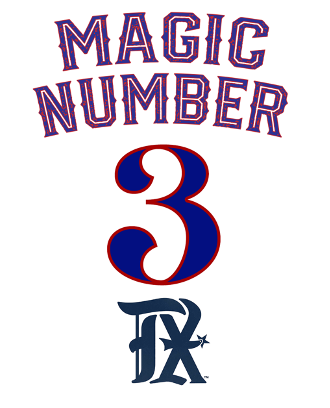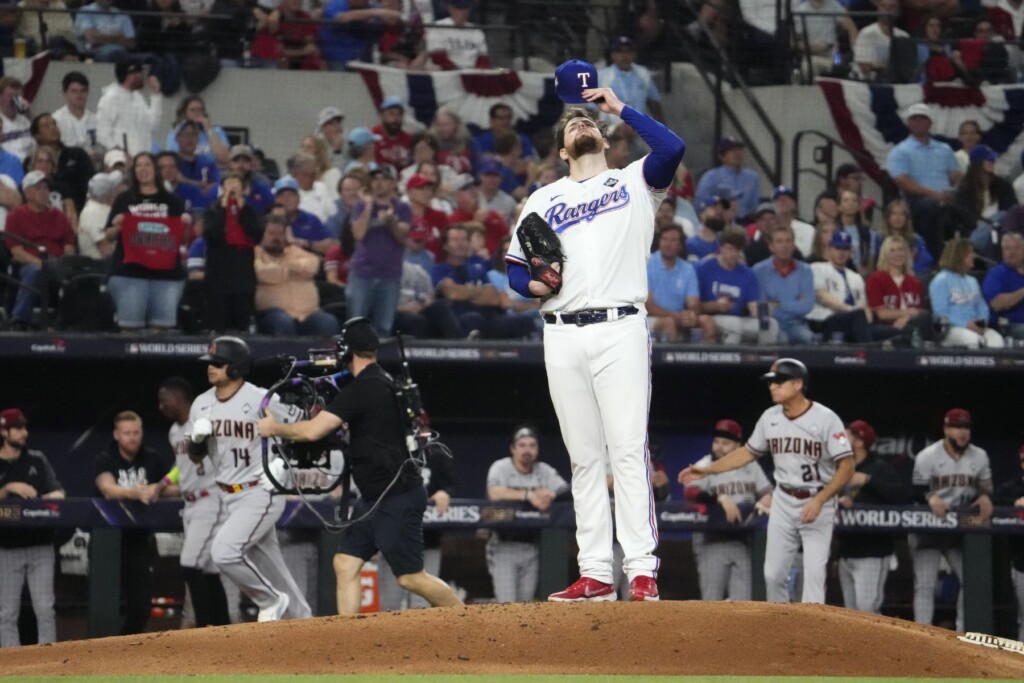Editor’s note: What’s old is new again. Mom jeans are fashionable. Same goes for loafers. You are, at most, three degrees of separation from someone with a variation of a mullet. And the Rangers are back playing October baseball.
So, back for the first time in seven years is Jamey’s Magic Number format. The premise is simple: for however many wins the Rangers have left to capture the World Series, Jamey will write that many items in this column. After dropping Game 2 to Arizona, 9-1, that number remains at 3. And if the Rangers go all the way and, for the first time, finish the deal? Well, that’s the only time you should be excited about a Jamey Newberg column with zero to say (even though you’ll forgive him when he inevitably finds a thing or five to remark upon the World Series trophy finally coming to Arlington).
Let’s have some fun.
Here we go: 3 things. Once again.

3. Ever since Texas and Arizona joined this tournament as wild-card entrants, the Rangers and Diamondbacks have had something of a shared script during their shocking runs to the World Series.
Texas, by virtue of its dramatic comeback win in Game 1, improved to 8-0 this postseason when scoring first.
Last night, Arizona ran its scoring-first record to 7-0 with an eight-run shellacking of the Rangers. Were it not for the late-innings heroics of Corey Seager and Adolis Garcia, Texas would be staring down three games on the road without a win to its name in this series.
Jordan Montgomery wasn’t at his best. The bullpen was not great, and neither was home plate umpire Quinn Wolcott. But none of those things was any more responsible for Diamondbacks 9, Rangers 1 than my inability to catch a foul ball in this one or a really lackluster night on the videoboard. (Example: running a pensive, plaintive Christian pop song called “Need to Breathe” while showing game highlights in the eighth inning was, in fact, a choice.)
No, this one was about the starting pitcher on the other side.
Texas is now 2-4 at home in the playoffs and 8-0 on the road. Clearly, all is not lost as the Rangers prepare to play three straight in the desert. But the Diamondbacks—not only in Game 2 but in their Game 1 loss as well—may have diagnosed a way to keep the Rangers’ vaunted offense at bay.
2. Merrill Kelly’s late-bloom story is no less remarkable than Garcia’s. The 35-year-old made his major-league debut at age 30, after stalling in five minor-league seasons with the Rays and spending the four years after that pitching in Korea.
Garcia ended Game 1 by vaporizing an 11th-inning pitch to the opposite-field seats.
Kelly started—and probably could have finished—Game 2 by vaporizing Rangers bats.
For seven masterful innings, Kelly used a varied, low-octane assortment of pitches and commanded them exquisitely. Yes, he occasionally exploited a generous Wolcott strike zone, but the story was how the right-hander kept Rangers hitters off balance and out of sync. Up and down the Texas lineup, there were wrong guesses and check swings and chase. Even some of the good takes looked uncomfortable.
Kelly didn’t allow a hit until Evan Carter’s 69-mph ducksnort over the middle infield in the fourth. Texas never had a runner on second base against him; the lone run he surrendered, a Mitch Garver homer in the fifth, was actually a very good pitch he’d probably tell you he would throw again. Going hitless with runners in scoring position is generally not a good recipe for success. Of course, not getting a runner in scoring position until two outs in the ninth inning makes it considerably harder.
Kelly hit his spots over and over and over again, changing speeds and eye levels and location and depth. Texas, which has pinned losses in this playoff run on higher-profile starters including Tyler Glasnow, Zach Eflin, Kyle Bradish, Grayson Rodriguez, Justin Verlander, Framber Valdez, and Cristian Javier, had no answer. Like with Zac Gallen before him, Rangers hitters appeared to have trouble acclimating to Kelly’s changeup, and it feels like that adjustment is going to be crucial for Texas going forward in this series.
Even the third-time-through penalty was, for Kelly, no sweat. In the regular season, he held opposing lineups to a .601 OPS the first time through the order and a .666 OPS the second time through, while the number jumped to .777 once hitters got a third look at him. But in Game 2, when the Rangers sent up the top of the lineup in the sixth, Kelly made quick work of Marcus Semien, Seager, and Carter, striking out all three—on a four-seamer (called), a cutter (swinging), and a spiked backfoot curve (swinging).
Despite Arizona scoring nine times on 16 hits (the most by a World Series offense in seven years and the first time in 21 years one had piled up at least 15 hits with two or fewer strikeouts) and four walks, despite all the mid-inning pitching changes for Texas, despite all those extended commercial breaks between halves, the game still clocked in at under three hours. That’s how dominantly and surgically Kelly shut the Rangers down.
1. Kelly was Jordan Montgomery on a night when Montgomery wasn’t. The big lefty’s velocity and spin rates were noticeably down, not only on his fastball but on his “death ball” curve as well. Though he was able to squirm out of consistent traffic for much of his night, Montgomery, on regular rest after coming out of the bullpen in Game 7 in Houston (but perhaps thrown off his routine by making only the third relief appearance of his career), failed to register a strikeout in his six-plus innings. Not just that: he didn’t earn a swing-and-miss until the fifth inning, when first-base umpire David Rackley ruled that Geraldo Perdomo failed to check his swing on Montgomery’s 51st pitch of the night.
The Diamondbacks didn’t crush Montgomery. Their offensive onslaught was dotted with infield singles, stolen bases, and sacrifice bunts, an M.O. they kept going once they got into the Texas bullpen and blew the lid off of the game. Aside from Gabriel Moreno’s solo home run in the fourth inning, every run Arizona drove in—both off of Montgomery and off Texas’ relievers—scored on a single.
And seven of their nine runs came with two outs. Montgomery and the bullpen had no putaway pitch to go to in Game 2, and to Arizona’s credit, the Diamondbacks lineup executed all night without doing so explosively. Sort of like their starting pitcher. A team with a run differential of -8 in the regular season jumped on the Rangers for an eight-run win, a demonstrative response to the heartbreak loss it had suffered the night before.
So, here we are. A best-of-five. The Rangers, not by choice, have seized what for them has been a road-field advantage, and they will need it to give Montgomery another chance to pitch. Or they can avoid that in the best way possible, by extending their unblemished postseason record away from Arlington until Arizona is out of chances to win a second game, and the Rangers, finally, are World Series champions.
But given the game plan that the Diamondbacks have designed to limit Texas offense, and that Gallen and Kelly have executed well, it feels like the Rangers will need to come back home if they are going to win this thing.
Scoring first in Game 3 on Monday would be a good start.
Author







